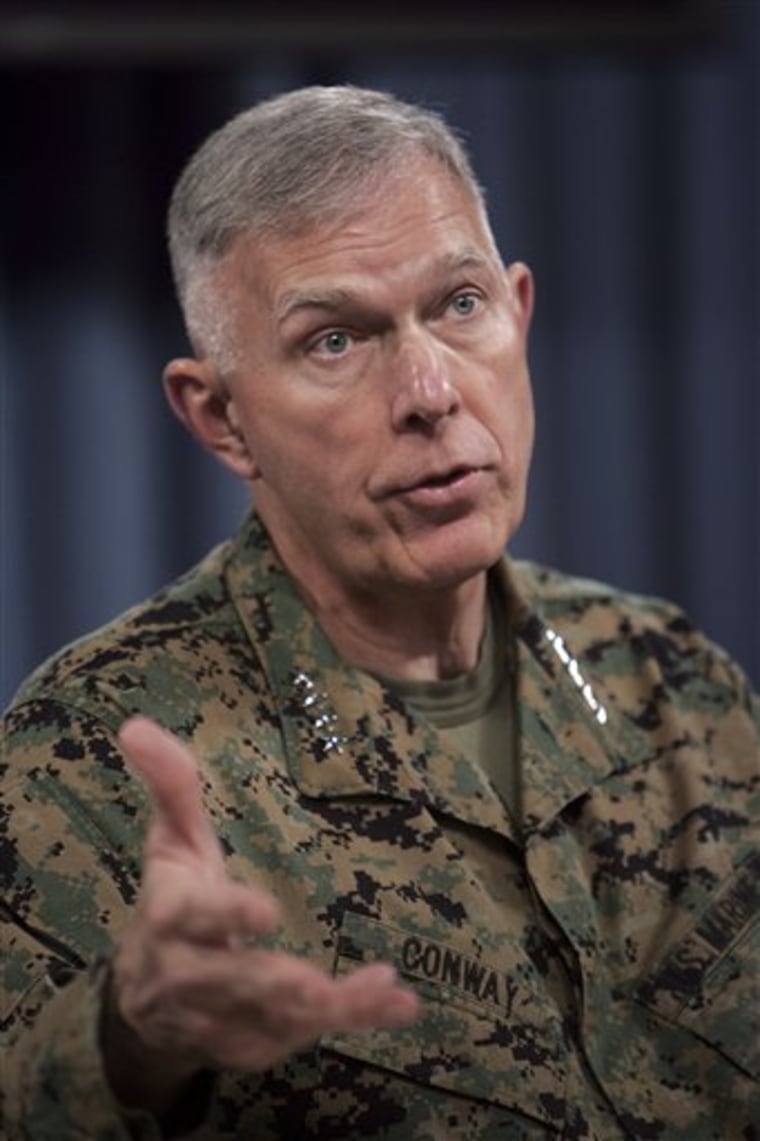There is a growing consensus among defense leaders to send a substantial contingent of Marines to Afghanistan, probably beginning next spring, while dramatically reducing their presence in western Iraq, the top Marine general told The Associated Press on Monday.
Gen. James Conway, the Marine Corps commandant, said in an interview that Marine units tentatively scheduled to go to Iraq next spring are already incorporating some training for Afghanistan into their preparations.
He said he has had discussions with Defense Secretary Robert Gates, and believes the Pentagon chief "would not object to the idea of a fairly strategic shift of focus of Marines from Iraq to Afghanistan."
"I don't want to put words in his mouth," said Conway, who has made no secret of his belief that Marines could be put to better use fighting in Afghanistan than their current peacekeeping, nation-building mission in Iraq. Gates understands, he said, "my public stance on the fact that we can be better used elsewhere. And he certainly hasn't told me to pipe down. So I like to think he understands the logic of it."
At the same time, Conway said that when the 22,000 Marines in Iraq's Anbar province leave, he believes they should all go, and not leave training teams behind.
More than a year ago, when early discussions of sending more Marines to Afghanistan became public, Gates signaled opposition to the idea, preferring to maintain the concentration on Iraq.
At that time, Conway said that Gates and others believed the timing wasn't right to shift the Marines out of Anbar province.
On Monday, however, Conway took a decidedly different tone.
"I just see that people have, over time, understood we don't want to take over Afghanistan, such as was rumored when we first started talking about a shift of forces," Conway said. Instead, he said officials now realize that the Marines are an expeditionary fighting force that is better suited to the Afghanistan battle.
Taliban still strong
In an illustration of the growing challenge for the U.S. in Afghanistan, an international think tank estimated in a report released Monday that the Taliban has a "permanent presence" in nearly three-quarters of the country. The International Council on Security and Development said the Taliban presence has grown from 54 percent of Afghanistan a year ago to 72 percent today.
The report described the Taliban as "the de facto governing power" in some towns and villages in southern Afghanistan, and it said the militant group has managed to advance into Afghanistan's western and northwestern provinces, as well as some areas north of Kabul, the capital.
Gen. David McKiernan, the commander of U.S. and NATO troops in Afghanistan, has said he needs up to 20,000 additional troops, including four combat brigades and thousands of support troops.
Other military leaders have cautioned, however, that they first need to build the infrastructure to accommodate the troops — including housing and helicopter pads.
Marines ready without infrastructure
Conway countered that the Marines could move in far more quickly because they don't need to wait for such logistical improvements.
"We're prepared to live austere for a time in order to take the fight to the enemy and build our infrastructure around us on deck," said Conway. "We have done that before, we can do it again."
Marine units generally enter combat with whatever resources they need, including their own combat aviation units and helicopters that would enable them to move through the mountainous terrain.
In particular, Conway said that there are serious problems in southern Afghanistan that the Marines can address. Insurgents there, he said, have lines into Pakistan, much like the Sunni Arab insurgents in Iraq's western Anbar province had remote passages from Syria, to move fighters and finances.
Gates has not yet approved additional forces for Afghanistan, but it's expected he may do that fairly soon. After that, military leaders will decide which units will go.
Conway said several Marine units will be moving into Iraq in January and February, and it is too late to redirect them to Afghanistan. Instead, he said another large turnover of units in Anbar around April could be shifted to Afghanistan if they are notified soon.
To plan for that possibility, Marines training at Twentynine Palms, Calif., are preparing for battle in both countries.
Asked about the expected cut in U.S. forces in Iraq, Conway acknowledged there's a running joke in the military that his Marines want to leave Iraq because there's not enough action there. Peacekeeping and nation-building — roles that troops are playing to a larger degree in Iraq now — are "not our forte," Conway said.
